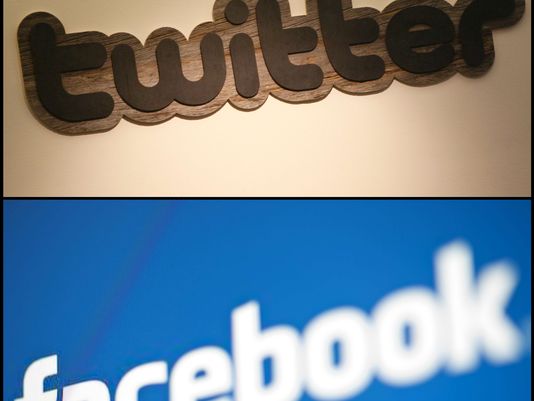Minyanville: Don't worry Twitter is not becoming Facebook
Is Twitter turning into Facebook? That was the question asked last Tuesday,[1] when the social network unveiled a new user profile page with Zuckerbergian design tendencies. Panoramic photos and visual chaos, long staples of the Facebook experience, will soon find their way to Twitter. Users will also have the ability to pin their favorite Tweets, a la Pinterest; and profile visitors will be able to filter old Tweets, and go digging with a shovel rather than a spade.
This wouldn't be the first time that a social network flattered its competitors by imitating them. Facebook adopted Twitter's iconic hash tags last year and is itself moving toward a more photographic page design[2]. The success of Snapchat and Instagram hasn't gone unnoticed, and at this point the big boys are less worried about differentiating themselves than they are about losing ground to upstarts.
So it's all the more striking that Twitter has yet to copy Facebook's defining feature: its algorithms. In the past, Twitter has taken a hands-off approach towards user content, preferring a chronological news feed that doesn't discriminate between individuals, groups, and businesses. This latest update may take some visual cues from the competition, but with pins and filters, control remains squarely in the hands of users.
Control over content has become a hot-button issue for social media companies, and algorithms mark the line of battle. Facebook first came under fire for its "curation" of posts in 2012, when businesses and social groups began experiencing a decrease in the reach of their posts. This drop coincided with the post-IPO rollout of Facebook's ad network, and the coincidence didn't go unnoticed. Last December, the social network announced that it would begin prioritizing "high quality content," such as links to articles. The change occurred as Facebook was inking partnerships with online news outlets.[3][4]
Over the last few months, Facebook has been telling owners of brand pages that the organic -- i.e. unpaid -- reach of their posts will soon disappear altogether, and that the only way to connect with followers will be to pay for promotion. This is the move that prompted food delivery service Eat24 to pen its viral breakup letter[5], comedian Rainn Wilson to call his Facebook account "kind of worthless," and countless small businesses to go into a tizzy.
Techcrunch suggests that declining exposure is simply the result of competition,[6] and too much content competing for too few eyeballs; and it's true, the noise level in social media is rising[7]. But it's also true that, for nearly two years, Facebook has tinkered with its news feed algorithms in an effort to combat "spam" -- a strange distinction in the land of baby pictures and mealtime play-by-plays -- and that these adjustments have had the all-too-convenient side effect of killing organic advertising.
More importantly, by only showing users what it thinks they want to see, Facebook discourages everyone from exercising judgment with "likes" and friend quests. The result is a larger, noisier network. The typical Facebook user has 200 friends, and this doesn't include brand likes -- whereas the typical Twitter account has just one follower. A chronological news feed tends to get rid of unwanted content, simply because the only way to avoid cat memes is by shunning the people who post them. Note that this results in better information for advertisers, as users are forced to prioritize whom they follow and what interests they pursue.
To be sure, a good social network and a good ad platform are two different things. By refusing to censor content, or throw businesses and social groups under the bus, Twitter makes it that much harder to sell them ads. Openness makes the network an effective broadcasting platform, but the fact that Tweets can be read by the general public also makes it more difficult to drive user growth, since most people are content to observe from a distance.
But would it have been better to emulate Facebook and cannibalize the social network for the sake of the ad platform? Maybe not. Larger friend networks are convenient from a commercial point of view, but they've also led Facebook into an ill-advised war on spam. After sacrificing brands for the greater good (and the bottom line), the question becomes, who's next?
This story originally appeared on Minyanville[8].
MORE from Minyanville[9]:
GOOGLE: Here comes the Glassholes[10]
APPLE: iPhone email becomes a dream with this app[11]
SMARTPHONES: The best part about T-Mobile's 'Simple Starter Plan'[12]
References
- ^ http://mashable.com/2014/04/08/twitter-profile-redesign/ (mashable.com)
- ^ http://www.nbcnews.com/tech/social-media/facebook-redesign-features-less-clutter-bigger-photos-n46271 (www.nbcnews.com)
- ^ http://dangerousminds.net/comments/facebook_i_want_my_friends_back (dangerousminds.net)
- ^ https://www.facebook.com/notes/facebook-media/more-ways-to-drive-traffic-to-news-and-publishing-sites/585971984771628 (www.facebook.com)
- ^ http://www.minyanville.com/sectors/technology/articles/why-facebook-does-not-like-sushi/4/1/2014/id/54405 (www.minyanville.com)
- ^ http://techcrunch.com/2014/04/03/the-filtered-feed-problem/ (techcrunch.com)
- ^ http://www.minyanville.com/sectors/technology/articles/Facebook-Keeps-Investors-Happy-Everyone-Else/12/16/2013/id/53041 (www.minyanville.com)
- ^ http://www.minyanville.com/sectors/technology/articles/Good-News-Twitter-Is-Not-Turning/4/14/2014/id/54566#ixzz2yruS4m5c?refresh=1 (www.minyanville.com)
- ^ http://www.minyanville.com/ (www.minyanville.com)
- ^ http://www.minyanville.com/sectors/technology/articles/Google-Will-Soon-Let-Anyone-in/4/11/2014/id/54579 (www.minyanville.com)
- ^ http://www.minyanville.com/sectors/technology/articles/iPhone-Email-Becomes-a-Dream-With/4/11/2014/id/54578 (www.minyanville.com)
- ^ http://www.minyanville.com/sectors/technology/articles/Best-Part-About-T-Mobile-New/4/11/2014/id/54559 (www.minyanville.com)










